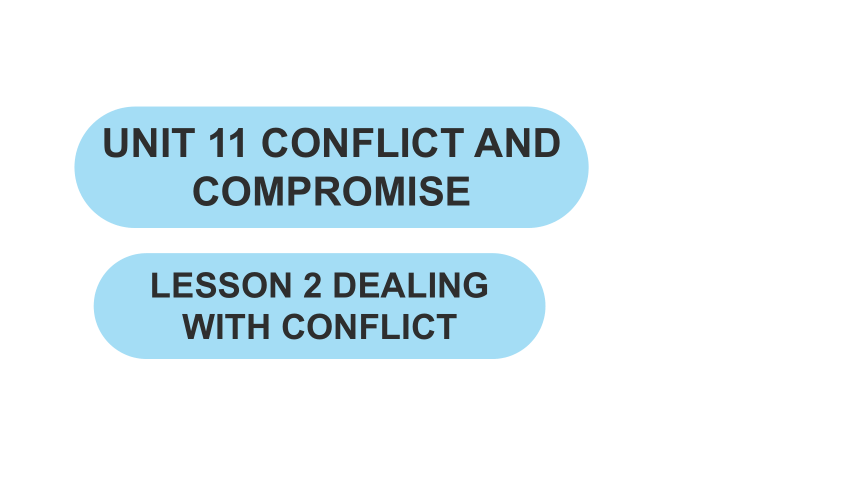(
课件网) LESSON 2 DEALING WITH CONFLICT UNIT 11 CONFLICT AND COMPROMISE LEARNING OBJECTIVES To listen and talk about conflicts and ways of dealing with them; To listen for general understanding; To listen for specific information and deep understanding; To think about possible consequences of conflicts; To understand and learn words and expressions in context; To compare personal opinions with the ideas of others; To learn and practice giving suggestions. KEY POINTS AND DIFFICULT POINTS To talk about a personal conflict; To understand and discuss ways of dealing with conflicts; To answer the comprehension questions; To listen for specific information of the text; To recall key information after listening; To express personal opinions and exchange ideas with others. LEADING IN Brainstorm some ways you use to resolve conflict in daily life. ACTIVATE AND SHARE Look at the different ways of dealing with conflict. Discuss with your partner which ways you would use to resolve conflict (√), and which you wouldn’t use (×). □ to respond to anger with more anger □ to negotiate with the other person □ to do nothing or try to escape □ to solve the problem yourself ACTIVATE AND SHARE Look at the different ways of dealing with conflict. Discuss with your partner which ways you would use to resolve conflict (√), and which you wouldn’t use (×). □ to repeat what you said in a different way □ to ask for help from somebody outside the situation □ to explain clearly what you want □ to put forward solutions LISTEN FOR UNDERSTANDING Listen to a radio programme about dealing with conflict, What are the three common ways to deal with conflict Complete the first column of the table. What are the three common ways To respond to anger with more anger; Doing nothing; To ask for help from somebody outside the situation LISTEN FOR UNDERSTANDING Listen again. Complete the rest of the information in Activity 2. Then, share with your partner what you have learnt about the three common ways to deal with conflict. What are the three common ways What does each way mean Why isn't it helpful This means you _____ more negatively and _____ to a situation of _____. The situation can _____ or even lead to _____. To respond to anger with more anger react violently conflict get worse violence LISTEN FOR UNDERSTANDING Listen again. Complete the rest of the information in Activity 2. Then, share with your partner what you have learnt about the three common ways to deal with conflict. What are the three common ways What does each way mean Why isn't it helpful The person says nothing and tries to _____ the situation. This does not _____. The person who withdraws feels _____. Holding your feelings inside can be _____ . Doing nothing escape or ignore solve any problems more and more angry with the other person very unhealthy LISTEN FOR UNDERSTANDING Listen again. Complete the rest of the information in Activity 2. Then, share ... ...

